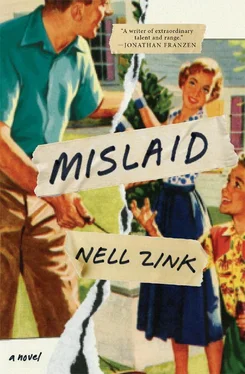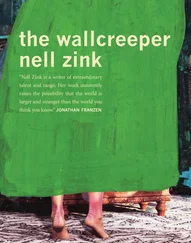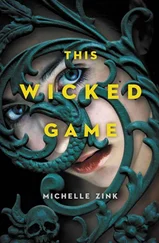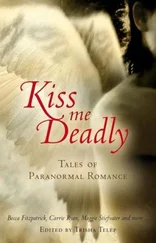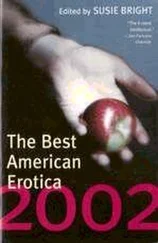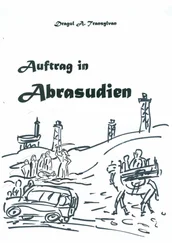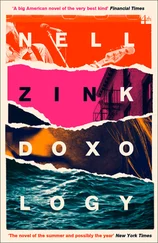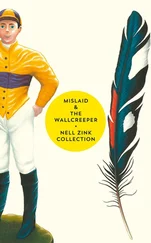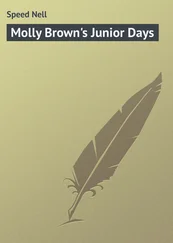Through the glass window of the librarian’s office he watched her shuffle away in her short, tight suit and strappy sandals with three-inch heels (hand-me-downs from Janice), unwittingly waggling her ass — the only black thing about her, in his opinion. He would have compared her to the one secretary in How to Succeed in Business Without Really Trying, but given her size, mood, and clothing, he kept thinking of Taxi Driver . He watched her collapse sobbing into the arms of a gangly black boy in a blindingly white old-fashioned tennis sweater. He said something that made her smile. She responded with something that made him nod. Their brief conversation gave the strange but distinct appearance, to someone who couldn’t hear it, of being charming, witty, and enticingly mysterious. The girl uttered a long sentence, tears on her eyelashes, and the boy looked at the ceiling for a moment before replying with another long sentence that made the girl cock her head quizzically, and so on. The two seemed oblivious to the prep school boys and girls slumped nervously in upholstered chairs. Then the boy looked at his watch. The next interview slot was his.
The interviewer forgot to make any notes about Karen at all. Because Temple blew him away. After he met Temple, he called the dean of admissions and gave him a heads-up. Modest, handsome, well-spoken, sharp as a tack. Temple in his essay had done his best to be funny, sprinkling it with quotations from Montaigne since French was the subject he enjoyed most. As a Joyce and Beckett maniac, he didn’t see himself as having a choice. The interviewer spoke a bit of French to see what would happen and Temple replied, his grammar convoluted and his accent proving beyond a doubt that he could also spell, that whether his ultimate posting was in Francophone Africa, which of course fascinated him, or the Soviet Union, as he dared to hope, a command of the French language would be indispensable to his activities as a diplomat, a career he felt The University could help him work toward. The interviewer felt a pang of envy.
The admissions office made Dee drive him to Charlottesville to interview for a merit scholarship. Temple left them bewildered and excited. What egg did he hatch from? Since when do things like that crawl out of the woods? They called the high school to make the principal nominate him, and handed him a four-year free ride. And not because he was underprivileged, but because they considered him one of their best applicants that year. The chief admissions officer described him to the committee as a high-potential whom they could not afford to lose. Financial aid, he could get anywhere. They would lose a bidding war with the Ivies. They needed a prestigious scholarship as bait.
As for his classmate, well, they’d be fools to admit a kid black as the ace of spades without admitting his girlfriend. There were maybe two hundred black girls enrolled at The University. One was absurdly fat and in a wheelchair, and another was a hair-trigger feminist with a habit of standing up in lectures and yelling, not to mention the two girls from prominent families in DC, both majoring in prelaw — whatever that was — who were so extremely attractive that it hurt the dean of admissions to look at them. These were the black girls one noticed. It was safe to assume they would be of no assistance to Temple. The dean recalled the one Black Student Alliance party he had attended as a bleak affair. It was hard to say what had depressed him more: the studied footwork of the couples on the dance floor, or the heartrending petty bourgeois piteousness of cucumber sandwiches passed around by accounting majors whose overly colorful bow ties had been expressly chosen to keep them from looking like waiters. Lonely, Temple might become a danger to himself and white women. The light-skinned girlfriend was a ready-made shock absorber and, after all, a legitimate applicant in her own right.
They let her in and gave her a grant. As the dean said, she could have qualified for food aid in Biafra. She was about the poorest applicant they’d ever seen.
To say Temple was ecstatic would be an understatement. He was lit from within. He had always suspected he had potential. Now he had official confirmation. The State Department beckoned. All he had to do was ace a triple major in international relations, Slavic languages, and government while slaking his thirst for math, science, literature, history, various upscale PE offerings such as rock climbing and squash, etc.
Meg, too, was overjoyed. Karen was fifteen and three-quarters, awfully young to go to college, but she had a commonsensical, matter-of-fact way of approaching things. You couldn’t call it maturity. It was passivity, that was all. Who knew what she really wanted from life. She seemed to regard Temple as her hereditary betrothed, which somehow got her off the hook for getting sexually involved with him. Meg and Dee agreed on that score: Temple and Karen were like Hansel and Gretel. They worried that Karen, surrounded by college boys who thought she was white, would ditch Temple and break his heart.
With UVA in the bag, Temple felt he had time to catch up on his black studies. He enjoyed Soul on Ice and The Autobiography of Malcolm X. Then Meg bought him Coming of Age in Missis-sippi . It was like giving a Jewish kid a coffee-table book about Auschwitz. Before then nothing had occurred to shake Temple’s belief in universal ethical values. Black men overcame (an intransitive verb), and that was that. Now he wondered if black people might not be owed a hearty collective thank-you, perhaps in the form of trillions of dollars.
His cogitations culminated, late in his senior year, in an ill-advised one-man show adapted from Ellison’s Invisible Man, to be performed onstage at the shuttered black high school where he had attended first through seventh grades. (The new high school’s auditorium was also the gym, so it was a bit cavernous for the arts.) The set was not ready until dress rehearsal. The many lightbulbs onstage in the final scene blew an irreplaceable antique fuse, necessitating the postponement and ultimately the cancellation of a one-act festival that had cost the senior English teacher an awful lot of work.
Ike Moody grumbled silently that if Temple were a little smarter he would notice not only that his people were victims of prejudice, but that his family had been run off their property and was living in a housing project. But of course a future diplomat thinks in world-historical terms, unfamiliar with basic post-Marxian concepts. . debt peonage, land reform, grumble, novels that leave him innocent as a newborn baby, grumble, grumble. . Not being a big reader or a particularly determined steward of pieces of paper, Ike didn’t know his creek bank had its origins in Reconstruction land grants that totaled nearly four hundred acres. Nor did he know he had held on for an unusually long time.
After World War II — in the years of the “Great Migration,” when black people came out en masse as cold-loving proletarians — many Virginia counties had become dotted with vast and beautiful army, navy, air force, and CIA bases. That is, certain people’s land was taken in great swathes by eminent domain for national security, and where black people once hunted, fished, and farmed, servicemen now dwelt in high-ceilinged brick mansions on the water, watching pleasure boats come and go. Whenever the US Congress leaned on the services to stop being dogs in the manger about such valuable real estate, they would — just an example here! — sell part to developers for a golf resort and the rest to retired officers. If you have to be bad, be so bad sympathetic hearers just shake their heads and give up.
Nobody suggested to Temple that his family had been cheated. Nobody wanted him growing up thinking people are bad or that the world is a bad place. That would have been Christianity or the Gnostic heresy, though they didn’t put it in those terms. They portrayed the world as in need of repair, not as populated by people you’d be insane not to hate. Resentment of collective ill-treatment of the race was fine, if it helped him fine-tune his sense of justice.
Читать дальше
Конец ознакомительного отрывка
Купить книгу
